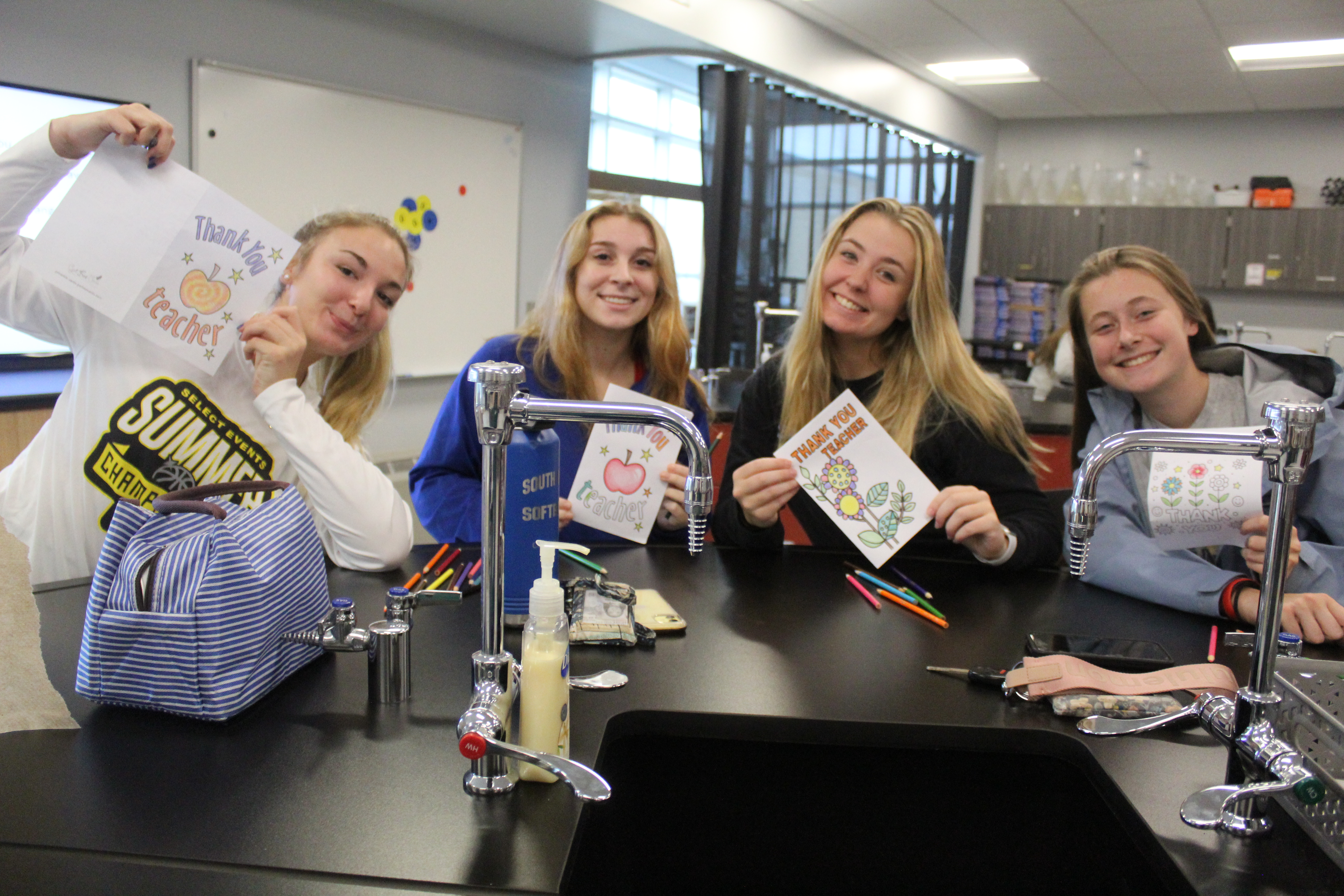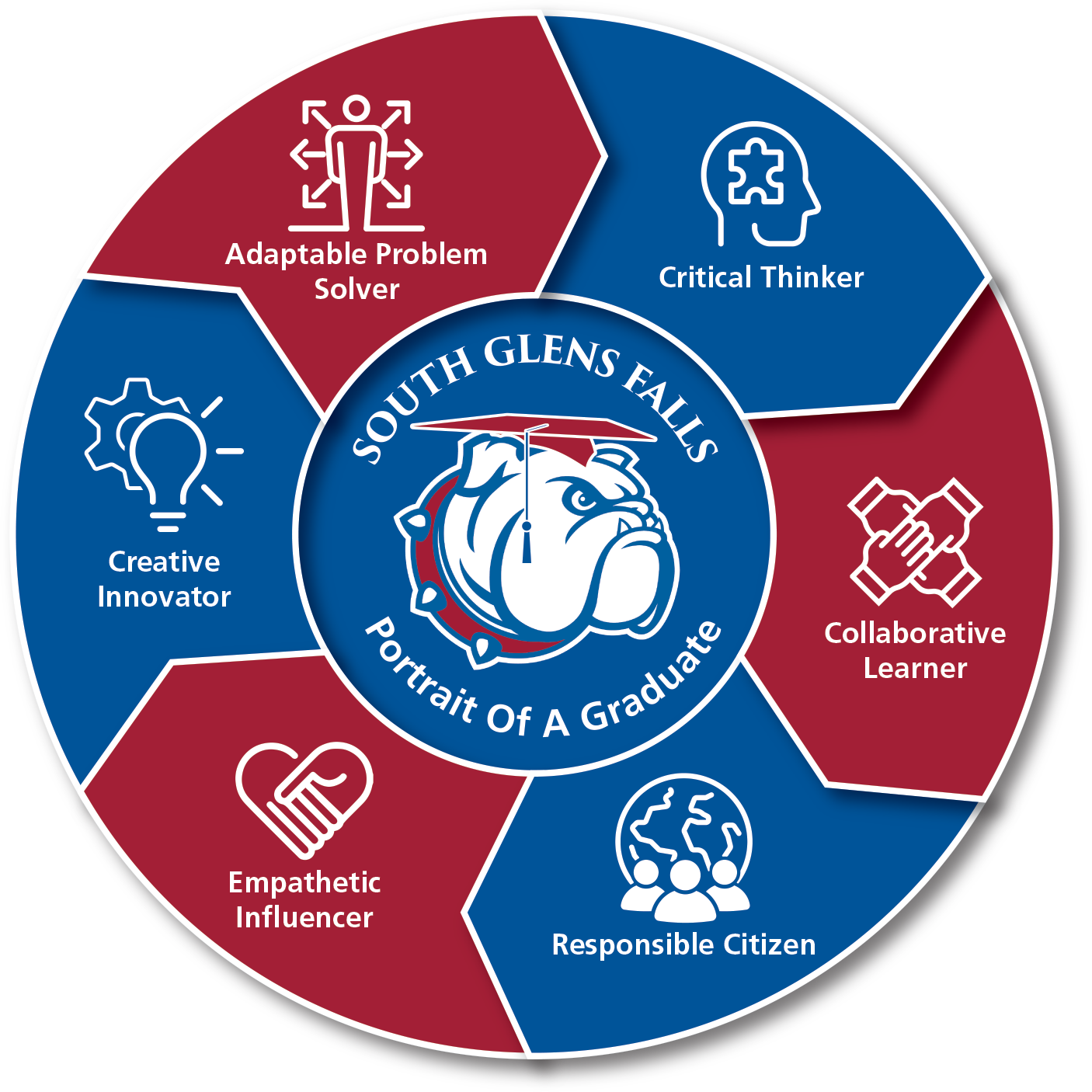Social-Emotional Learning
The South Glens Falls Central School District is continuing to build on its theme of mental health by placing a priority on social-emotional wellbeing for students and staff.
The district is committed to making resources available to address mental health, behavioral, and emotional needs of students. Staff will be provided with professional development opportunities on the implementation of SEL best practices, ACEs (adverse childhood experiences), and the impact of trauma on social-emotional development, behavior and learning.
Advisory Committee
The Social Emotional Learning (SEL) Advisory Committee consists of parents, teachers, staff, building leaders, district leaders and pupil personnel services providers. This collaborative, shared-decision making group works to inform the practice of promoting social-emotional learning and mental wellbeing for all students, faculty and staff.
K-12 Comprehensive School Counseling Plan
The goal of the school counseling professionals is to foster relationships and implement programs designed to enhance students academic, career, and social/personal development. A copy of the plan can be found on the district website or by clicking here. The plan was developed by the school counseling department and is reviewed and updated as needed.
Referrals to Support Services
The SGF school district is committed to supporting all students’ mental health, behavioral health and emotional support needs.
Referrals for school-based counseling and support services can be made by the teacher or parent by contacting the building.
Referrals to outside services and supports can be made by the school counselor, school social worker or school psychologist.
Referral to the Student Empowerment program through Saratoga Center for the Family can be made by filling out the referral form.
A Community Resource Guide is a comprehensive list of resources in the South Glens Falls area. The list is available on the district website.
Professional Development
The district is committed to providing teachers and staff with ongoing professional development opportunities to support students during and after the pandemic, as well as provide support for the development and promotion of social-emotional learning skills for students, faculty and staff.
Social Emotional Learning (SEL)
SEL will be incorporated into daily instructional and social practices. The five core competencies of SEL as defined by the Collaborative for Academic, Social and Emotional Learning (CASEL) are:
Self Awareness
Self Management
Social Awareness
Relationship Skills
Responsible Decision Making

Students across the district get a chance to reset during our annual Wellness Days
What is SEL and what does it look like?
SELF-AWARENESS (SA)
The ability to accurately recognize one’s own emotions, thoughts, and values and how they influence behavior. The ability to accurately assess one’s strengths and limitations, with a well grounded sense of confidence, optimism, and a “growth mindset.”
Identifying emotions
Accurate self-perception
Recognizing strengths
Self-confidence
Self-efficacy
SELF-MANAGEMENT (SM)
The ability to successfully regulate one’s emotions, thoughts, and behaviors in different situations — effectively managing stress, controlling impulses and motivating oneself. The ability to set and work toward personal and academic goals.
Impulse control
Stress management
Self-discipline
Self-motivation
Goal setting
Organizational skills
Engagement
SOCIAL AWARENESS (SO)
The ability to take the perspective of and empathize with others, including those from diverse backgrounds and cultures. The ability to understand social and ethical norms for behavior and to recognize family, school, and community resources and supports.
Perspective-taking
Empathy
Appreciating diversity
Respect for others
RELATIONSHIP SKILLS (RS)
The ability to establish and maintain healthy and rewarding relationships with diverse individuals and groups. The ability to communicate clearly, listen well, cooperate with others, resist inappropriate social pressure, negotiate conflict constructively and seek and offer help when needed.
Communication
Social engagement
Relationship building
Teamwork
RESPONSIBLE DECISION MAKING (DM)
The ability to make constructive choices about personal behavior and social interactions based on ethical standards, safety concerns and social norms. The realistic evaluation of consequences of various actions, and a consideration of the wellbeing of oneself and others.
Identifying problems
Analyzing situations
Solving problems
Evaluating
Reflecting
Ethical responsibility
*Source: https://casel.org/
Multi-Tiered System of Support (MTSS)
MTSS is an evidenced-based approach to the delivery of services to support social emotional wellbeing. It is a three-tiered system to provide universal interventions for all students, targeted interventions (secondary) for students identified as at-risk and intensive interventions (tertiary) for students identified as high-risk. The district will identify staff/teams in support of MTSS.
ELEMENTARY LEVEL
Universal Strategies (All)
In-class lessons/interventions for SEL
Classroom interventions and strategies to support SEL
Open Circle program implemented in most elementary schools
Professional development on developmental trauma
School Social Worker to work with all students and teachers
Secondary Strategies (At-risk)
Individual or group counseling (in-school)
Collaboration with school based team
Collaboration with outside service providers (i.e. doctors, therapists, counselors, etc.)
Progress Monitoring
School Psychologist and School Social Worker to work directly with students
Tertiary Strategies (High-risk)
Individual counseling (in-school)
Outside counseling
Student Empowerment Program (counseling through Saratoga Center for the Family)
Collaboration with outside service providers (i.e. doctors, therapists, counselors, etc.)
Progress Monitoring
Case Management, School Psychologist and School Social Worker to work directly with students, families and outside providers
MIDDLE SCHOOL LEVEL
Universal Strategies (All)
Student survey/self screener to identify needs
In-class lessons/interventions for SEL
Classroom interventions and strategies to support SEL
Professional development on developmental trauma
Restorative Practices
Social Comprehension
School Social Worker to work with all students and teachers
Secondary Strategies (At-risk)
Individual or group counseling (in-school)
Collaboration with school based team
Collaboration with outside service providers (i.e. doctors, therapists, counselors, etc.)
Progress Monitoring
School Social Worker, School Counselor, and School Psychologists to work directly with students
Suicide Awareness Program
Tertiary Strategies (High-risk)
Individual counseling (in-school)
Outside counseling
Student Empowerment Program (counseling through Saratoga Center for the Family)
Collaboration with outside service providers (i.e., doctors, therapists, counselors, etc.)
Progress Monitoring & Case Management
School Psychologist, School Counselor and School Social Worker to work directly with students, families and outside providers
HIGH SCHOOL LEVEL
Universal Strategies (All)
Student survey/self screener to identify needs
In-class lessons/interventions for SEL
Classroom interventions and strategies to support SE
Professional development on developmental trauma
Restorative Practices
School Social Worker to work with all students and teachers
Secondary Strategies (At-risk)
Individual counseling (in-school)
Collaboration with school based team
Collaboration with outside service providers (i.e., doctors, therapists, counselors, etc.)
Progress Monitoring
School Social Worker, School Counselor and School Psychologists to work directly with students
Day of Dialogue
X-Factor Program
Tertiary Strategies (High-risk)
Individual counseling (in-school)
Outside counseling
Student Empowerment Program (counseling through Saratoga Center for the Family)
Collaboration with outside service providers (i.e. doctors, therapists, counselors, etc.)
Progress Monitoring & Case Management
School Psychologist, School Counselor and School Social Worker to work directly with students, families and outside providers
Social Emotional Learning (SEL) Toolkit
An SEL Toolkit will be made available with strategies to address the CASEL competencies. The toolkit will be available to all teachers, staff and families and contain strategies pertaining to the appropriate grade level and skill.
SAMPLE TOOLKIT
Self Awareness – Demonstrates awareness for his/her emotions
Grade: K-2
Skills
Recognize and accurately names emotions/feelings.
Describes emotions and the situations that causes them (i.e. triggers).
Strategies
Have students play charades by putting feelings down on a piece of paper to act out.
Create a check- in board where students put their names next to a picture or symbol that represents feelings. (Can also use colors.)
Read stories or show pictures books with themes and ask students to discover the words or phrases used to describe emotions.
Grade: 3-5
Skills
Explain the possible outcome associated with different forms of communicating emotions.
Strategies
Ask student to examine characters from a book or story and how they communicate their emotions.
Ask students to role play a situation at occurs in the classroom and have them process how they might feel.
Ask students to write a short story with illustration about a situation that made them angry without using the words anger, angry or mad.
Grade: 9-12
Skills
Recognize how positive and negative expression of emotion affects others.
Acknowledges emotions and determines the appropriate time and place to safely process it.
Strategies
Discuss with students historical events and how misinterpretation triggered a negative event.
Ask students to reflect and analyze in journal or in pair shares how their thoughts and emotions affect decision making.
Conduct class meetings/circles to discuss helpful strategies for conflict resolution.
Have students create the gratitude journal to acknowledge and appreciate the kindness of others.
Adult
Skills
Recognize the relationship between thoughts, feelings, and reactions to people.
Recognize personal, cultural and linguistic assets.
Recognized the big picture in complex situations.
Strategies
Practice self care. Give yourself permission to do something for yourself each day.
Discover your emotional triggers so you can master your recations.
Take time to exercise.
Identify and practice approach self management techniques that can be used in the workplace.
*Adapted from https://www.tn.gov/content/dam/tn/education/safety/safe_sch/SPC_Resource_Guide.pdf.
School Counseling/Guidance Programs
New York State Education Law requires the South Glens Falls Central School District to develop district-wide and building-level comprehensive developmental school counseling guidance plans and to post these plan on district websites. These plans are presented below.
K-12 Comprehensive School Counseling Plan
School Counseling Action Plan
Janelle Sipowicz,
Director of Counseling/Social-Emotional Learning
518-792-9987
